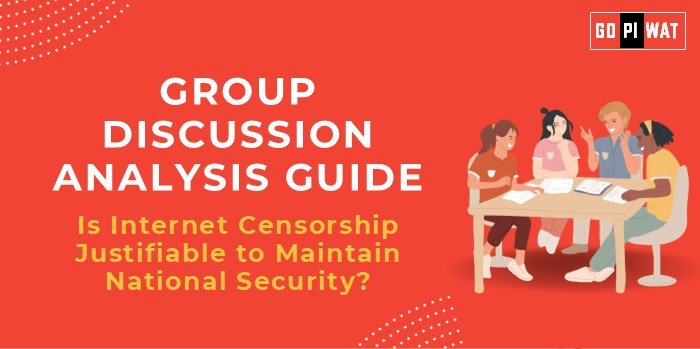📋 Group Discussion Analysis Guide: Is Internet Censorship Justifiable to Maintain National Security?
🌐 Introduction to the Topic
Context Setting: “In a hyperconnected world with 5.52 billion internet users globally (67.5% of the global population as of October 2024), the balance between free expression and national security has never been more crucial.”
Topic Background: Internet censorship, often positioned as a mechanism to safeguard national security, involves restricting access to certain digital content. While nations like China and Russia employ extensive censorship citing security concerns, countries like India grapple with cyberattacks, fake news, and digital misinformation that challenge governance and public safety.
📊 Quick Facts and Key Statistics
- Cybercrime Costs: Expected to hit $10.5 trillion annually by 2025, emphasizing the need for security-focused policies.
- Fake News Spread: Studies confirm false news proliferates faster on social platforms, complicating crisis management.
- Global Internet Users: 5.52 billion users (October 2024), demonstrating the scale of online activity and potential vulnerabilities.
- Indian Cyberattacks: 593 incidents reported in H1 2024, revealing significant vulnerabilities in India’s digital framework.
👥 Stakeholders and Their Roles
- Governments: Legislate and enforce censorship laws to prevent cyberthreats and misinformation.
- Tech Companies: Collaborate on content moderation and cybersecurity measures.
- Citizens: Engage in responsible internet use and report malicious activities.
- International Bodies: Advocate for global cyber governance norms to combat transnational threats.
📈 Achievements and Challenges
Achievements:
- Enhanced cybersecurity with reduced exposure to external threats.
- Mitigation of fake news through robust content moderation policies.
- Encouragement of safer digital environments via data protection laws like GDPR.
Challenges:
- Freedom of Expression: Critics argue censorship stifles individual and press freedoms.
- Global Disparity: While countries like Estonia balance openness with security, others prioritize control over rights.
- Economic Impact: Overregulation could hinder innovation and digital business growth.
📌 Structured Arguments for Discussion
- Supporting Stance: “National security is paramount, and regulated internet access prevents critical vulnerabilities.”
- Opposing Stance: “Censorship undermines democracy and could be exploited for political gains.”
- Balanced Perspective: “While security is essential, policies should aim for proportional and transparent enforcement.”
✨ Effective Discussion Approaches
- Opening Approaches:
- “Given the $10.5 trillion projected cybercrime costs by 2025, prioritizing security is a necessity.”
- “With false news spreading faster than truth, strategic interventions are unavoidable.”
- Counter-Argument Handling: “Acknowledging the risks to freedom, frameworks like transparency audits can ensure balanced implementation.”
🔍 Strategic Analysis of Strengths and Weaknesses
- Strengths: Strengthened security frameworks, reduced misinformation.
- Weaknesses: Risk to freedoms, potential misuse by authorities.
- Opportunities: Innovations in AI-driven moderation, global partnerships.
- Threats: Escalating cyber warfare, resistance to censorship measures.
🌍 Connecting with B-School Applications
- Real-World Applications: Explore censorship’s impact on fintech security and e-governance.
- Sample Questions:
- “How can censorship balance national security with freedom of expression?”
- “Evaluate India’s readiness for robust cyber governance.”
- Insights: Assess censorship’s role in managing digital economies or safeguarding infrastructure.


